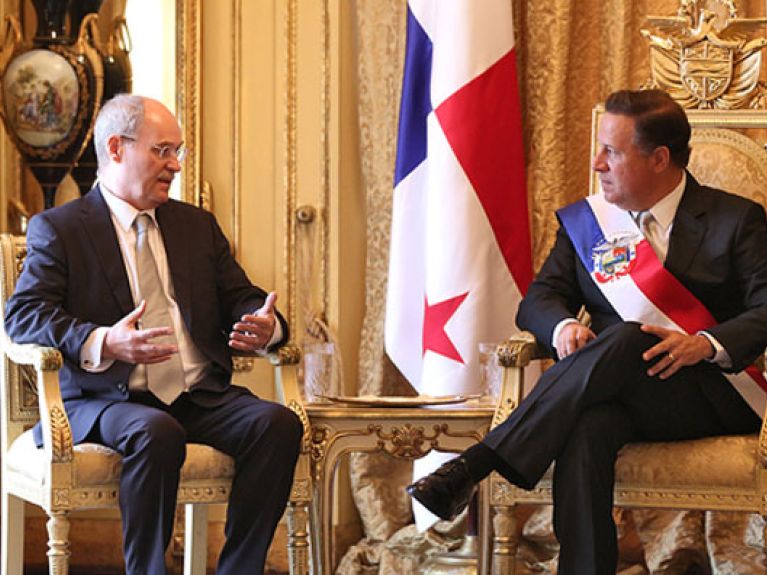Ambassador Karl-Otto König in Panama
In the deutschland.de-series “Foreign posting”, ambassadors and high-ranking German staff in international organizations give insights into their work. Part 23: Karl-Otto König in Panama.

What issues are currently shaping bilateral relations between Germany and Panama?
We look upon Panama as a like-minded partner that is committed to the same values as we are and is an important collaborator in many areas in the region. Panama is the most modern and most globalized economy in Latin America. Economic growth has averaged 8.2 per cent over the last fifteen years, according to the Panamanian Foreign Ministry, a figure that other countries can only dream of. The economic potential of the country and its significance as a regional business location for the German economy are of course two important priorities.
What special ties are there between Panama and Germany, and in which areas would you like to deepen the relationship?
For Panama and Germany, 1989 was a key year. In Germany it was the year that the Wall fell. In Panama the American invasion overthrew the dictator Noriega. Since then both countries have been developing dynamically and are applying the experience gained in their transformation processes to the international context. Panama’s return to democracy is an exemplary success story. Our two countries share a commitment to democracy, human rights and an open market economy.
The German presence in Panama has grown slowly but steadily. This can be seen from the increasing number of members in our Chamber of Commerce. The potential is far from exhausted. It’s only a question of time before this is also reflected in our cultural relations. A first step here is the announced founding of a German private school, which will commence next school year with some primary school classes.
Recently Panama has often been in the focus of the news. In April 2016 what are called the “Panama Papers” revealed financial malpractices to the public. What has the Panamanian government done to close these loopholes? And was or is Germany helping in this in any way?
The publications have severely damaged Panama’s reputation as a hub of finance. President Varela began 2014 with the promise to combat corruption and strengthen Panama’s standing as a financial centre against abuse. The first reforms to prevent money laundering and the financing of terrorism went in the right direction. Panama was removed from the FATF list of uncooperative countries. Following publication of the “Panama Papers” Varela’s government undertook two things: first, it appointed an international commission, under the chairmanship of the American Nobel laureate in economics Professor Stiglitz, to analyze the loopholes in the regulations and propose reforms by the end of the year. Then Panama declared its willingness to the OECD to agree to an automatic comparison of tax data with various OECD members on a bilateral basis. Still, in spite of all the reforms, much remains to be done to regain the trust of international partners. Between Panama and Germany, too, there are specific negotiations underway to arrange an automatic tax data comparison as part of a tax agreement. In this, Germany, as an OECD country, is happy to make its expertise in the field available to Panama.
In June 2016 the new Panama Canal was opened and already in March there was the first direct Lufthansa connection between Frankfurt-Panama. What effects has this had on the economic relations between the two countries?
Next to the Suez Canal, the Panama Canal is the most important waterway in the world. Panama has now modernized the canal. Today ships carrying three times the load they carried before can pass through the canal. This will have far-reaching consequences for East-West trade between Asia and the United States as well with Europe. At the same time, the infra-structure of the relevant ports, not only in Panama but in the entire region, is being accordingly upgraded, and the transport of liquid gas through the Panama Canal should increase significantly. This has opened many opportunities for the German economy, especially for our shipbuilding industry and logistics experts.
German captains of industry, but not only them, are happy to be able to get here faster thanks to new air connections. So far about 30,000 German tourists have visited this country, which is really very attractive for tourism. Their number is likely to increase. Also because of the increasing number of cruises offered.
The inside and the outside view of a country often differ. What, on the basis of your personal experience, should be said about Panama?
In the last decade and a half the almost four million Panamanians have achieved amazing things. Panama City has made itself into one of the most modern capitals of the continent. The skyline is breathtaking and casts its spell over every visitor. It is the mirror of a service society. According to the World Bank, Panama has developed into the leading logistics specialist in Latin America. It is a hub of international maritime and air transport, and an important trading centre, with the world’s second largest free trade zone in Colón. The United Nations handles its international humanitarian aid via Panama, and it is the UN’s largest location in Latin America. Here you’ll find the most modern ports in Latin America, and the entire canal-related infra-structure is being expanded and linked. For instance, the underground is just now being extended with a second and third line. A total of eight lines are planned.
And the country is also an attractive tourist destination, with a very good tourist infrastructure and great natural beauty. The island world is fascinating. If you like jungle, you’ll get your money’s worth. And for mountain hikers too the country is an El Dorado. Eco-tourism is really getting into stride. And whoever has the good fortune to enjoy a cup of Geisha coffee goes into rhapsodies over it. Among coffee gourmets, the Geisha bean, which unfolds its full flavor only 1,600 metres up, is regarded as the ne plus ultra.

